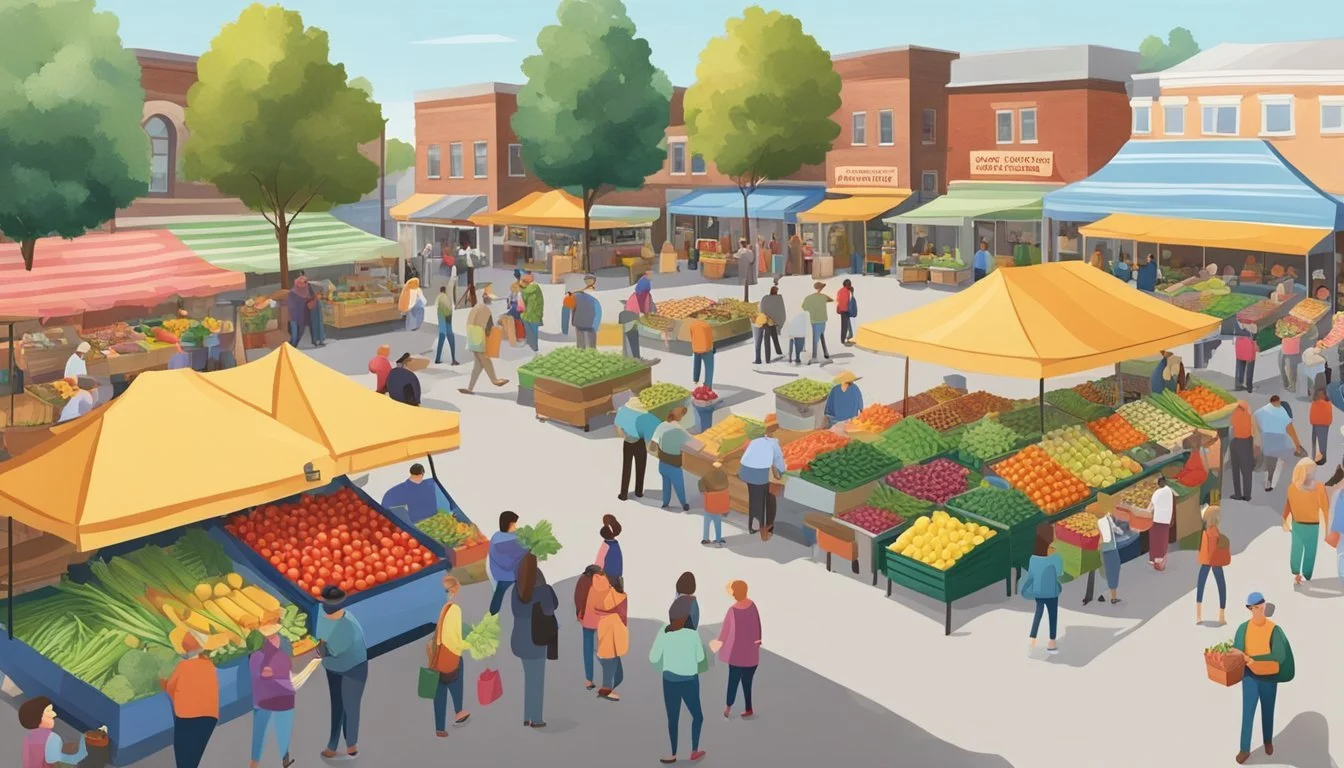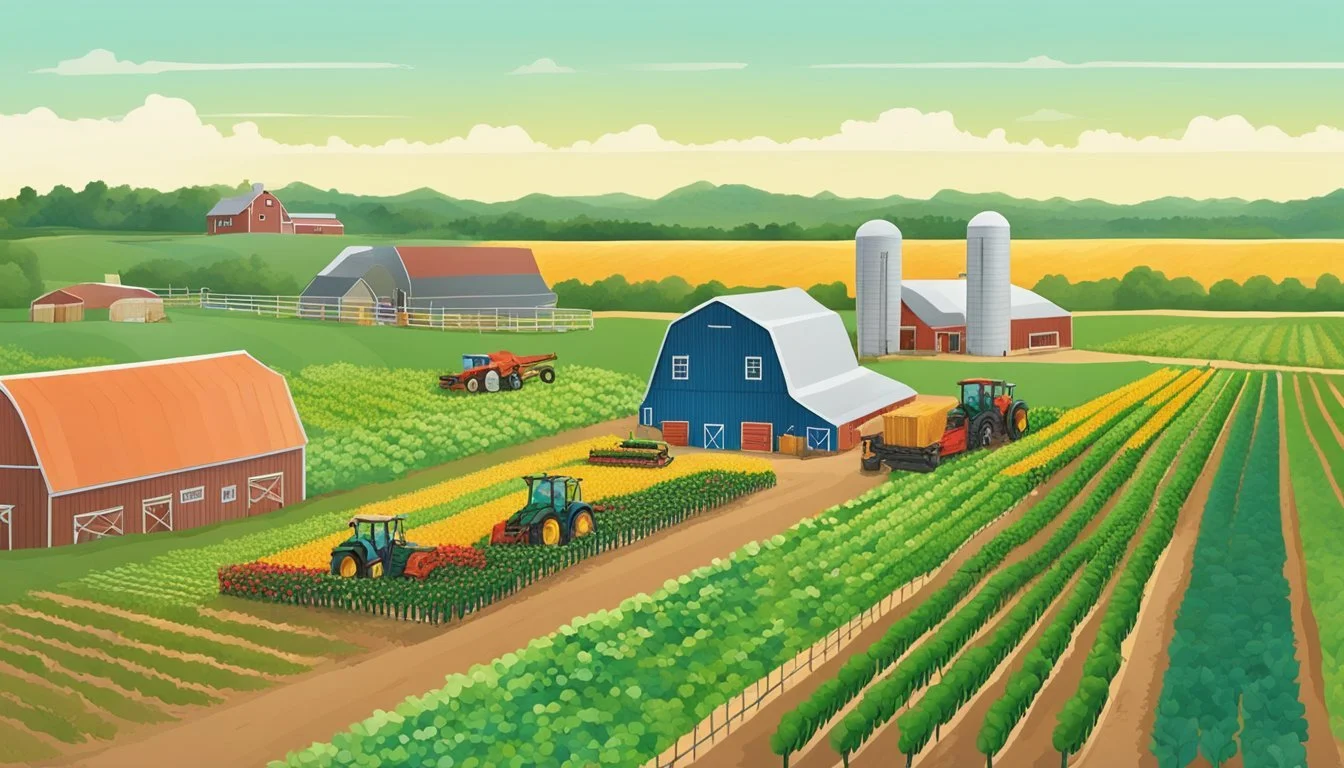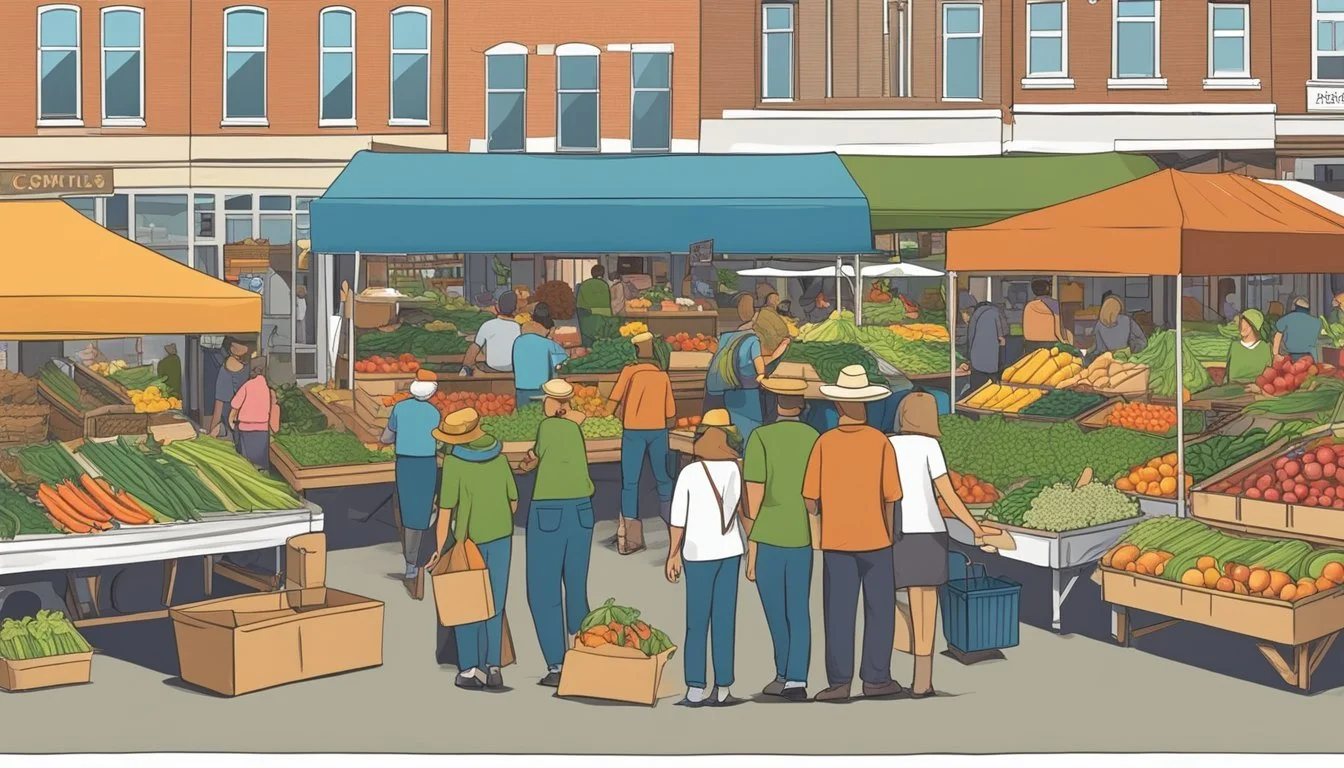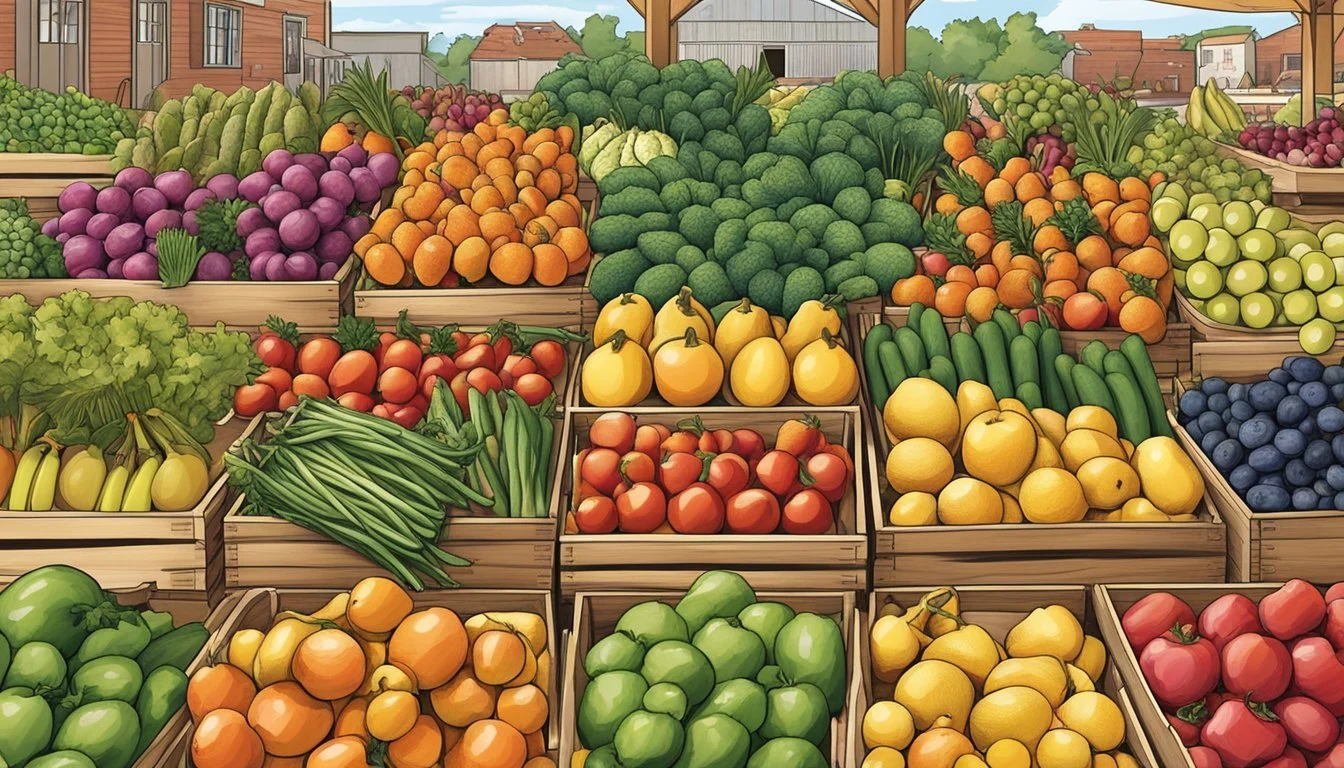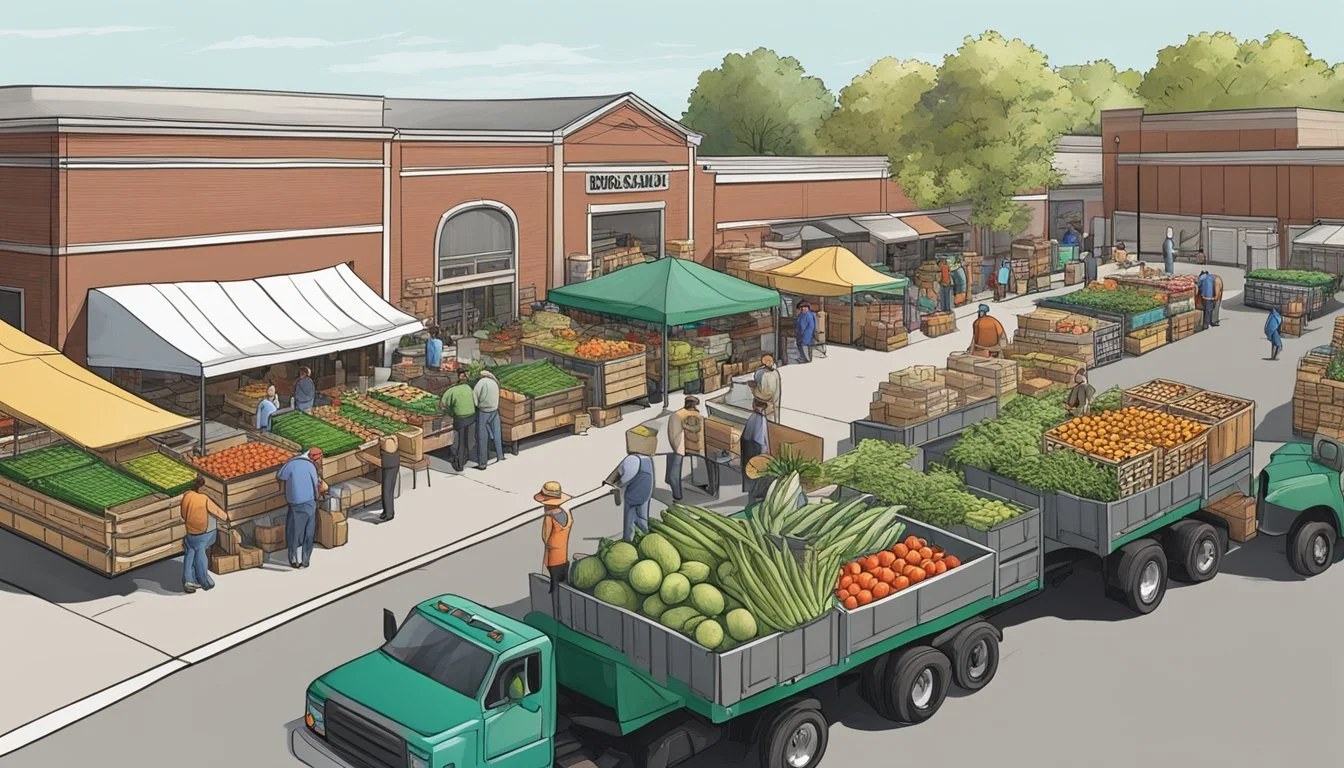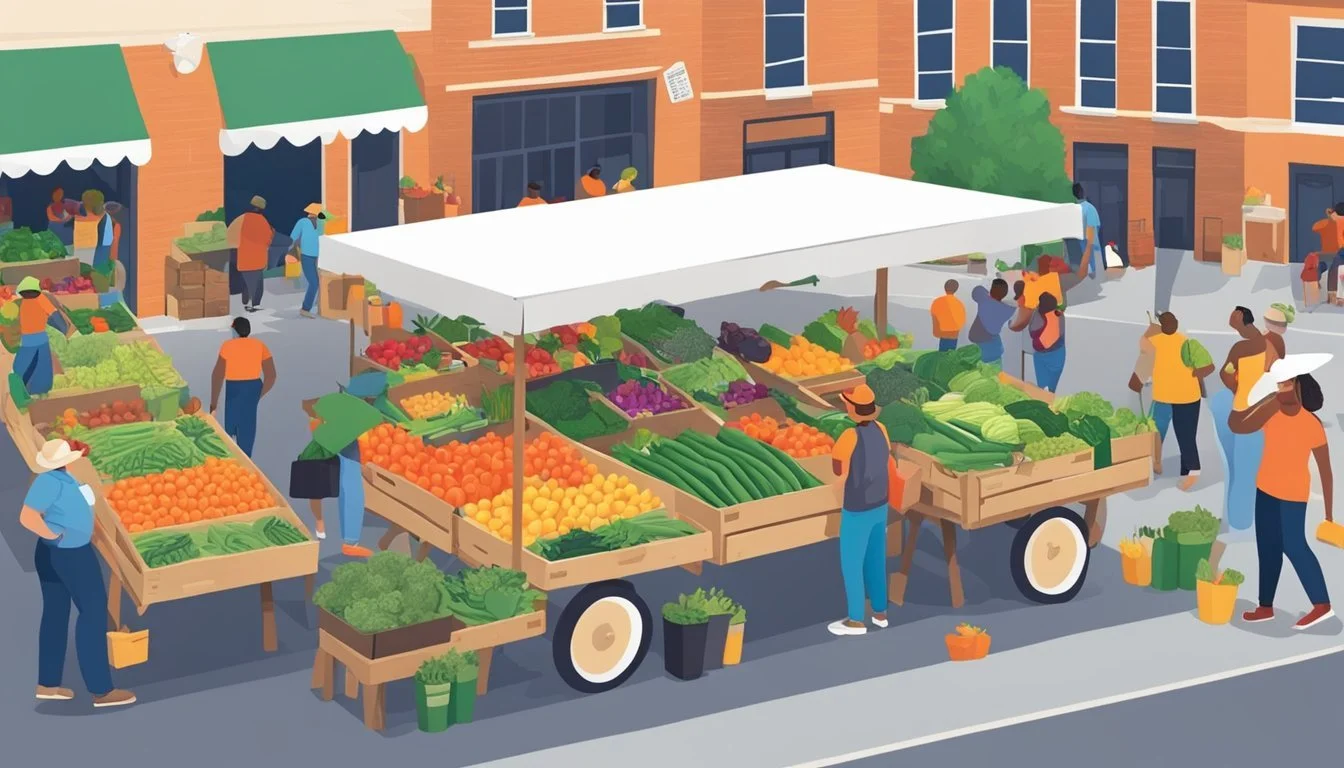Community Supported Agriculture (CSA) in Aurora, IL
A Guide to Local Produce Sharing
Community Supported Agriculture (CSA) has carved a niche in the agricultural landscape of Aurora, Illinois, offering individuals a way to directly invest in local farms and reap the benefits of fresh, seasonal produce. The concept of CSA is fundamentally a subscription-based model where consumers purchase shares of a farm's harvest in advance, thus providing farmers with upfront capital for their operations. In return, shareholders receive weekly or biweekly allotments of the farm's yield throughout the growing season. This exchange fosters a relationship between residents and farmers, emphasizing not only the economic but also the communal bond inherent in the agriculture industry.
Aurora's proximity to fertile farming land and a growing interest in sustainable practices contribute to the thriving CSA ecosystem. Farms such as Nichols Farm and Orchard utilize the CSA model effectively, tailoring their offerings to include a diverse array of cultivars, thereby satisfying the culinary and nutritional desires of local communities. While the size and offerings of each CSA program may vary, they all share the commitment to sustainable, locally-sourced food production, enhancing food security and promoting healthy eating habits in Aurora and the surrounding areas.
CSAs in Aurora encourage community engagement and provide an educational platform about the significance of sustainable agriculture. They enable residents to have a better understanding of where their food comes from and the labor that goes into producing it. The model has gained considerable traction and is supported by organizations like Illinois Extension and the Illinois Institute for Rural Affairs, reflecting its importance to the region's agricultural framework.
The CSA Model
Community Supported Agriculture (CSA) represents a partnership between local farmers and community members that fosters direct access to high-quality, fresh produce. This model is fundamental in strengthening the connection between the consumption and production of food.
Understanding CSAs
CSAs function on the basis of membership. Individuals—referred to as subscribers—purchase a portion of the anticipated harvest, known as shares, from local farmers or cooperatives. These shares are usually delivered in regular intervals, commonly on a weekly basis, providing subscribers with a selection of seasonal produce throughout the farming season. This system offers mutual benefits for both the farmers, who receive upfront capital and a dedicated market, and the community members, who obtain fresh, seasonally harvested food.
Benefits of CSA Membership
Membership in a CSA offers numerous advantages for subscribers:
Guaranteed produce: Members receive consistent deliveries of fresh food during the harvest season.
Support of local agriculture: CSA funds directly support local farmers, helping to sustain their operations.
Food transparency: Members know where their food comes from and often have information about farming practices.
Seasonal variety: Subscribers get diverse produce corresponding with the seasonal harvest, which can encourage healthier eating patterns.
Types of CSA Shares
Different types of shares may be offered to accommodate the varying preferences and needs of consumers:
Vegetable Shares: The most common type, typically including a variety of vegetables.
Fruit Shares: Often provided when a farm has orchard operations or partnerships with local fruit growers.
Meat/Dairy Shares: These might be available from farms that raise livestock or produce dairy items.
Whole Diet Shares: This broader type can encompass vegetables, fruit, eggs, meat, and dairy.
Each farm or cooperative will decide which types of shares to offer based on what they can sustainably provide and what their subscribers value.
Local Farms Participating in CSA
Aurora's commitment to sustainable agriculture is exemplified by the inclusion of several local farms in the CSA model. These farms offer residents a chance to support local farmers and enjoy fresh, organic produce directly from the source.
Cedar Valley Sustainable Farm
Cedar Valley Sustainable Farm prides itself on being one of the pioneers in offering CSA shares to the Aurora community. Focusing on organic methods, it equips members with a diverse array of farm-fresh products throughout the year. Patrons can expect a seasonal mix of fruits, vegetables, and sometimes even eggs or meat.
Wellhausen Farm
At Wellhausen Farm, the emphasis is on preserving the local farming heritage and nurturing the community connection. This farm provides a selection of produce through its CSA program, enabling consumers to be a part of the local food movement. CSA members receive weekly deliveries of farm-grown vegetables, highlighting the farm's dedication to natural practices.
Heritage Prairie Farm
Heritage Prairie Farm stands out for its dedication to certified organic farming. The farm invites the community to join their CSA program, which boasts not just a variety of vegetables but also occasional honey from their apiaries. This approach ensures that CSA members directly support sustainable agriculture and contribute to a resilient local food system.
Subscription Details
Community Supported Agriculture in Aurora, Illinois, offers individuals the opportunity to subscribe to a steady supply of fresh, locally-sourced produce. The subscription details include how one can subscribe, the benefits of a membership, and the financial aspects of the commitment.
How to Subscribe
To subscribe to a CSA in Aurora, individuals typically select a local farm, review the subscription options, and sign up either online or directly through the farm. They may choose a weekly pickup day, like Wednesdays or Saturdays, ensuring they receive the freshest seasonal produce available. The process is straightforward, usually requiring just a few steps to initiate membership.
Subscription Benefits
Subscribers benefit from a weekly or monthly collection of fresh, nutrient-rich, seasonal produce. This directly supports the health and nutrition of the subscriber while endorsing sustainable agricultural practices. Membership often fosters a closer connection between consumers and their food sources, contributing to a more informed community regarding organic farming and food production.
Financial Commitment
A financial commitment to a CSA includes paying for a share of produce for a season upfront. This cost varies by farm but reflects the value of receiving high-quality, organic vegetables and fruits over the course of the subscription period. Payment plans may be available, allowing for a partitioning of the total cost into more manageable intervals.
Payment Option Description Frequency Full Season Payment Pay for the entire season upfront receive uninterrupted weekly or monthly produce pickups. Once per season Installment Plan Pay for your subscription in scheduled installments. Monthly
By subscribing to a CSA, individuals financially support local farmers, gain access to fresh food weekly or monthly, and contribute to the sustainability of their local agricultural community.
Seasonal Offerings
Community Supported Agriculture in Aurora, IL thrives on seasonal offerings, affording members fresh, locally-grown produce throughout the year. Each season brings a new share of farm products, tailored to what naturally grows best during that time.
Spring Share
In the spring, CSA members can expect an abundance of green and leafy produce. The cool weather is ideal for lettuce varieties and spinach, and these often make their first appearance in spring shares along with radishes and spring onions. Herbs like cilantro and parsley also feature prominently.
Summer Share
The summer harvests are typically the most bountiful, with a vibrant variety of fruits and vegetables. Tomatoes, a staple of summer CSAs, ripen to perfection alongside crisp cucumbers and an assortment of beans. Sweet corn is another crowd-pleaser, often picked at the peak of sweetness for CSA boxes. Summer is also a peak season for a range of berries, depending on local farm offerings.
Fall Share
As the weather cools, fall shares transition into heartier produce. Members can expect a mix of broccoli, kale, and robust root vegetables, such as carrots and beets. The autumnal palette is also represented by a mix of winter squash, which include varieties like butternut, acorn, and delicata.
Winter Share
Winter shares depend heavily on storage and greenhouse-grown produce. Winter squash and root vegetables stored from fall harvests remain key features. Hardy greens like kale and collards may persist, supplemented by greenhouse-grown produce such as lettuce and herbs. Some CSAs might also include preserved goods like jams or pickles to round out the winter offerings.
Distribution and Delivery
Community Supported Agriculture (CSA) programs in Aurora, IL have established systems that cater to both convenience and freshness. These programs offer various pickup locations as well as home delivery options to accommodate the preferences of CSA shareholders.
Pickup Locations
CSA shareholders can typically collect their shares from designated pickup locations. These locales are often strategically chosen for their accessibility and association with the community, such as local farmers markets and sometimes directly at the farm itself. For example:
Farmers Markets: CSA members can collect their boxes during regular market hours.
Farm Specific Sites: Specific farms might offer on-site collection points.
Home Delivery Options
For those who prefer the comfort of receiving their fresh produce directly at their door, many CSA farms provide home delivery services. Deliveries are usually made on a weekly basis and farms charge an additional fee for this service, depending on the distance from the farm to the customer's residence. For instance:
Week Home Delivery Fee Weekly Charge Based on mileage
Local Delivery: Some farms also define a local delivery area, which may attract a lower delivery fee.
Drop Off Points: In certain communities, farms might collaborate to offer a collective drop-off point for multiple customers.
Community Impact
Community Supported Agriculture in Aurora, IL, has a multifaceted impact on the local area. Not only does it help in sustaining the economic fabric of the community, but it also fosters strong relationships and bolsters environmentally sustainable practices.
Strengthening Local Economies
By subscribing to CSAs, residents of Aurora provide a direct financial lifeline to farmers in the region. This system guarantees a market for small-scale farmers, allowing them to focus on quality and sustainable production. The influx of funds helps to maintain agricultural jobs and the local economy benefits as money circulates within the community rather than leaking out to large, distant corporations.
Direct Impact: Subscriptions provide farmers upfront capital to cover initial costs.
Local Advantages: Increased economic activity strengthens the town's fiscal health.
Building Community Relationships
Community Supported Agriculture bridges the gap between urban dwellers and rural farmers, creating meaningful connections through food. Subscribers often have the opportunity to visit farms and meet the people behind their produce, fostering a sense of community and mutual respect.
Sense of Community: Shareholders often engage with growers, engendering a communal spirit.
Relationship Building: CSAs organize events and farm visits, cementing the producer-consumer relationship.
Supporting Sustainable Practices
CSA farms typically employ sustainable farming methods that reduce the carbon footprint associated with large-scale commercial agriculture. These practices conserve soil health, protect water quality and promote biodiversity, leading to a smaller environmental impact.
Sustainable Farming: CSA encourages environmentally conscious farming techniques.
Carbon Footprint Reduction: Local consumption reduces the need for long-distance food transport.
Navigating Challenges
Effective management of Community Supported Agriculture (CSA) requires tackling unique challenges such as weather unpredictability and customer expectations. These issues directly affect the growing season and the availability of fruits and vegetables.
Weather and Crop Variability
In Aurora, Illinois, CSA farmers must cope with the unpredictability of weather patterns. Unfavorable conditions can lead to crop failures or reduced yields. To mitigate these risks, farmers:
Diversify their crop selections: Planting a wide variety of fruits and vegetables ensures that the impact of weather on any single crop is buffered by others.
Implement season extension techniques: Tools like greenhouses and hoop houses can protect crops from extreme weather, potentially lengthening the growing season.
Managing Expectations
Community Supported Agriculture is a partnership between farmers and community members, which hinges on clear communication about the realities of farming. Farmers manage shareholder expectations by:
Providing detailed communications: Regular updates about crop progress and potential issues help prepare members for what they can expect in their upcoming CSA boxes.
Educating members about seasonality: Sharing information about the natural growth cycles of different crops fosters understanding of what produce is available during each part of the growing season.
Additional Resources
To assist readers in exploring Community Supported Agriculture in Aurora, IL, the following resources offer comprehensive directories, culinary inspiration, and opportunities for learning. These tools can enhance one’s involvement and satisfaction with local CSA programs.
CSA Directories and Networks
Local directories provide a valuable service for those looking to connect with CSA options in the Aurora area. The Illinois Community Supported Agriculture Directory is a notable example, serving as a marketplace of CSA shares. Consumers can explore a variety of CSA offerings, gaining access to fresh, locally grown produce.
Illinois Extension | UIUC: A detailed directory that includes CSA farms across Illinois, facilitating a direct relationship between consumers and farms.
LocalHarvest: Offers a searchable database for CSAs, providing a convenient way for individuals to locate CSA farms in the vicinity of Aurora, IL.
Recipes and Cooking Tips
A CSA membership often introduces subscribers to new vegetables and farm products they may not be familiar with. To assist members in making the most out of their share:
Cooking Demonstrations: Some CSA farms offer cooking demonstrations to help members learn how to prepare their new vegetables. These may be available on-site or through online platforms.
Recipe Sharing: CSA networks often have accompanying websites or newsletters featuring recipes that specifically cater to the seasonal produce found in their shares.
Educational Workshops
Participation in CSA often comes with the opportunity to learn more about sustainable agriculture and food preparation through workshops and farm events.
On-farm Workshops: CSA farms may offer workshops on topics ranging from organic farming practices to food preservation, strengthening the connection between consumers and the land.
Sustainable Agriculture Education: Partnering organizations may provide resources to broaden one’s understanding of sustainable agriculture, outlining the benefits it brings to communities and the environment.

